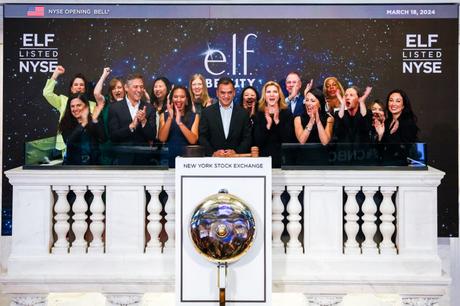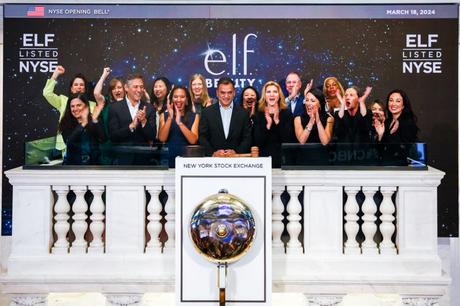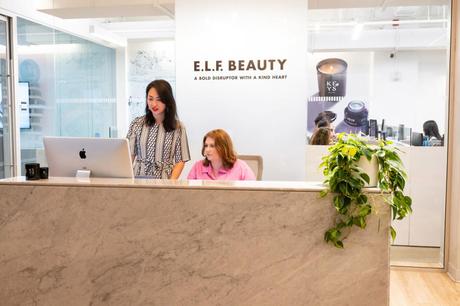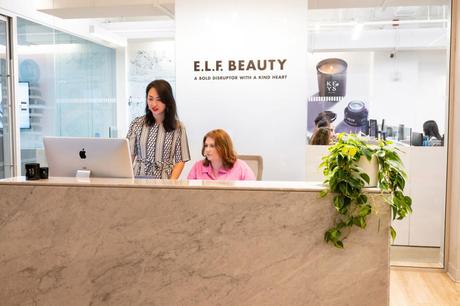"Mad Money" host Jim Cramer isn't normally a fan of the CEOs he interviews on his CNBC show.
But in a memorable televised interview with Elf CEO Tarang Amin in 2023, he did just that during a discussion about the key factors behind the company's 15th consecutive quarter of growth. (Elf has since posted 21 growth figures.) After Amin outlined the product innovation and social media successes that fueled Elf's popularity, Cramer asked how the company stays so close to its consumers.
More from WWD"We have talent because we have a great workforce that knows our consumers," Amin replied, describing Elf's internal demographics: a workforce that's more than 65 percent Gen Z and Millennials, more than 75 percent women, and more than 40 percent diverse. And that's without even mentioning a board of directors, one of only 4 out of 4,200 in corporate America, that's two-thirds women and one-third minorities.
"I'm going to go out of shape here," Cramer replied, setting his script aside.
"It's no coincidence that you are where you are with who you are."
Amin couldn't agree more. The soft-spoken CEO is a fervent believer that Elf's outsized success is driven by its internal culture, one that places a premium on equality and diversity.
"I actually started my career in beauty many, many years ago as part of the team that relaunched Pantene in the early '90s. I love beauty," he said. "I love the passion for ideas, the passion for innovation. But one of the things I didn't like about beauty is that it felt exclusionary at times."
One of the very first goals he set for himself when he became CEO in 2014 was to diversify the company's workforce. "The first goal I had was that our team would reflect the community that we were serving, so that's why we're so diverse," Amin said. "When you have a team that reflects your community, you can move much faster. You don't have to go to a focus group to find out what they like, how they engage, or where they live."
The story continues


Amin is equally passionate about advancing diversity and inclusion on Wall Street, and not just at Elf. He has set a goal of doubling the number of female and diverse members on corporate boards by 2027.
Elf launched its "Change the Board Game" initiative earlier this year when it announced a partnership with the National Association of Corporate Directors and the sponsorship of 20 female and/or diverse board-ready candidates through NACD Accelerate, a two-year program that creates a pathway for executives to prepare for board positions.
In May, that ambition was underscored with a media campaign on digital screens around Wall Street called "So Many Dicks."
In collaboration with the targeted agency Oberland, Elf conducted research into the boards of American companies. It showed that the boards of directors of these listed companies contained more men named Richard, Rick or Dick (Dicks) than women and other diverse groups.
"We don't want to be one of the four and we feel that as good entrepreneurs we have a responsibility to encourage others," Amin said of the campaign.
"It all starts with intention," added Elf's CFO Mandy Fields. "It's very intentional to have more women on our board because that's the community that we serve to make sure that we have diverse candidates as part of our board selection. Just setting that intention helps get things moving. Without intention or a purpose or something to anchor yourself to, you're just drifting."
Not every company is willing to step up to the plate with such a bold campaign, but Fields says there's no better way to push Wall Street to promote diversity and inclusion more effectively.
"I actually got a lot of compliments on the 'Change the Board Game' campaign. It was a unique way for Elf to break into that topic," she said. "Diverse groups, diverse management teams, boards of directors, they generate better results than other companies. No one can argue with our 21 consecutive quarters of growth, we're doing the right thing at Elf."
To ensure this ethic permeates the rest of the organization, Scott Milsten, senior vice president, general counsel and chief people officer at Elf Beauty, emphasized the importance of ensuring the workforce reflects the consumers it serves.
"We start with a common thought: this is a beauty company, a young beauty company," he said. "It naturally attracts like-minded people."
Elf doesn't have quotas, but the recruiting team always strives to present a diverse pool of candidates, he said.
Amin has also created an environment where everyone is free to give focused, specific feedback in the spirit of helping the team succeed, eliminating the need for performance reviews. "Nobody ever has to wonder what I'm thinking. I'll tell you," he said. "I want to make sure everyone feels comfortable expressing themselves... I didn't want the crutch of a performance review. I wanted to take that stuff away. Sometimes the reviews were based on who's going to get paid more, who's going to get paid less. To me, it's like, no, we're all in this together. I want everyone to actually make a lot of money. I want everyone to rise and fall together."
Amin doesn't just pay lip service to this idea. He puts his money where his mouth is, literally, by creating a compensation program that gives equality to every employee, regardless of where they are based or what their level is.
"I said from day one that I want to make sure that not only the people at the top, but everyone who works at the company benefits from the long-term value creation that we are going to achieve," Amin said.


This applied to all global markets, which was no easy feat before the company went public, as it required the creation of something called "phantom capital."
"We really believe that extraordinary performance should bring extraordinary returns to everyone, and we're thrilled that it did," Milsten said. "It makes your work so much more impactful. I would just shudder at the thought of going into a room and looking at a stock ticker, and six people are celebrating, and 27 people don't know what we're high-fiving about. It doesn't work for me on a personal level. It doesn't work for Tarang on a personal level, so we really plan to do it differently."
To stay in touch with staff, Amin sends out a weekly company email, which started during the pandemic (his 227th had been published by the time this article went to press), and then there's an afternoon at Amin's.
Every summer, he invites everyone from the leadership team and their spouse from all markets to his home for cocktails and food. He does two in California, where the company is headquartered, and one in New York.
"We fly people from London to Tarang's house to have cocktails. It's one team, one dream, right? There's no, 'Oh, the American leaders are important, not the British leaders,'" Milsten said.
Marcus Collins, a former Wieden + Kennedy executive who is a professor of marketing at the University of Michigan, has seen that dynamic firsthand. He was invited to speak at an Elf offsite in Cabo San Lucas, Mexico, and struck up a conversation with a tablemate over dinner. It turned out she had joined the company about two months earlier and was the office coordinator.
Collins was surprised that even such a relatively recent employee would be invited on a company trip to an exotic location. He recounted the meeting during his tech review the next morning with Amin and several other executives.
"'Oh, you met Rosie!'" he remembers Amin saying to him, astonished that the CEO even knew her name.
"I've never seen a CEO, CMO, CPO anywhere who knows the people who are lower down in the social hierarchy of the organization," said Collins, who has worked with Nike, Google, Apple and others over the course of his career. "This idea about people-centricity and democratization - it's real," he continued, laughingly noting that one of the off-site's most popular sessions was on EBITDA [earnings before interest, taxes, depreciation and amortization].
"The fact that everyone owns stock is not normal. That's a democratizing aspect," Collins said. "Beauty is just a vehicle that Elf is in the world with, but they're driven by something much bigger and it's made tangible and manifested through their cultural practices."
The Best of WWD